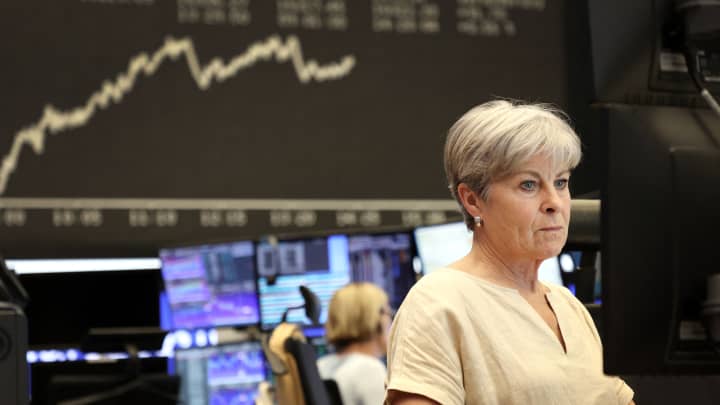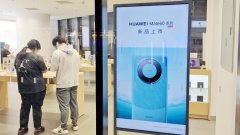
European markets closed lower Friday as investors continued to digest earnings and the .
The pan-European index ended the session down 1.1%, with all sectors in negative territory. Tech stocks led losses, closing down 2.1%, while autos and mining stocks slid 1.8% and 1.7%, respectively.
it ended a 9 billion Swiss franc ($10.27 billion) loss protection agreement and a 100 billion Swiss franc public liquidity backstop originally put in place by the Swiss government when the bank in March. UBS shares ended the day around 4.7% higher.
were mixed Friday on the back of the latest U.S. inflation data, as were , although the was inching lower by the end of trade in Europe.
and 0.2% month on month, data from the Bureau of Labor Statistics showed Thursday, slightly below expectations.
However, inflation data Friday complicated the picture with the rising 0.3% from the previous month, more than expected.
European stocks closed lower Friday. The U.K.'s ended the session 94.4 points lower at 7,524.1, was down 164.3 points at 15,832.1, and slid 93.4 points to close at 7340.1. also closed trade 300.3 points lower at 28,274.7.
— Karen Gilchrist
The producer price index, a gauge of how much wholesalers pay for raw goods, rose more than expected last month, advancing 0.3%. Economists polled by Dow Jones expected an increase of 0.2%.
— Fred Imbert
Many investors saw a landmark study by obesity drug maker as a sign that health insurers couldn't ignore the benefits patients could see from these pricey medicines.
That trial showed obese and overweight adults saw a 20% decline in the occurence of heart attacks and strokes when taking its Wegovy. Shares of Novo Nordisk and its rival rallied , but a selloff hit shares of a host of companies hard and many have not yet recovered.
Companies that manufacture continuous glucose monitors or robots for bariatric surgery were hit, as well as those developing liver disease treatments.
For a variety of reasons, analysts have said some of as the anti-obesity drugs won't wipe out the markets they have created for their products. One example is . Its shares are down about 6% week to date, but the average analyst target for the stock projects 34% gains ahead.
CNBC Pro subscribers can
—Christina Cheddar Berk
U.S. markets opened lower Friday after the latest inflation report due this week came in
The Dow Jones Industrial Average was 0.3% lower in early deals, while the S&P 500 was down 0.5%. The Nasdaq Composite also slid 0.7%.
— Karen Gilchrist
U.K. growth figures surprised to the upside in the second quarter with 0.2% growth, according to the Office for National Statistics. Household consumption and manufacturing output bolstered the numbers.
Economists polled by Reuters had expected U.K. gross domestic product to be flat for the three-month period, as demand continues to be hampered by tight monetary policy and sticky inflation.
Sterling was up 0.3% against the dollar on the news, snapping its three-day losing streak.
The full story can be found .
— Hannah Ward-Glenton
Core inflation in was at 5% for July, down from 5.7% in June, while food prices also slowed down.
The core inflation rate doesn't factor in food or energy prices.
Food costs rose 12.7% in July, down from the 13.7% uptick in June. Numbers have been falling since March, when food inflation reached 15.9%. Year-on-year energy prices dropped by 3.7% in July, after a 3% decline in June.
— Hannah Ward-Glenton
on Friday said it ended a 9 billion Swiss franc ($10.27 billion) loss protection agreement and a 100 billion Swiss franc public liquidity backstop that were put in place by the Swiss government when it in March.
Credit Suisse has also fully repaid the francs obtained from the in March, as the lender teetered on the brink after a collapse in shareholder and investor confidence, UBS confirmed.
"These measures, which were created under emergency law to preserve financial stability, will thus cease to exist, and the Confederation and taxpayers will no longer bear any risks arising from these guarantees," the Swiss government said in a statement Friday.
— Elliot Smith
While stock markets worldwide have rallied this year on fading fears of a global recession, a number of stocks have been left behind.
For some investors, these beaten-down equities will present a tantalizing opportunity.
CNBC Pro screened for stocks in the FTSE Developed Markets index, which is made of about 4,000 large and mid-cap stocks, that have lost value this year, yet analysts expected them to not only rebound but also double in value from current levels.
— Ganesh Rao
Hong Kong listed shares of Chinese tech giant Alibaba jumped over 3% after the a 51% rise in attributable profit and a 14% increase in revenue year on year for the three months ended June.
That's the biggest annual increase in sales since the September 2021 quarter, according to Refinitiv data.
Hangzhou-headquartered Alibaba has been undergoing major changes in recent months, including splitting the company and organizational reshuffles.
Current CEO and Chairman in September, but remains head of Alibaba's cloud computing business, as it pushes toward a public listing. Alibaba veteran Eddie Wu will succeed him as CEO, and Joe Tsai will take over as chairman, the .
"Alibaba delivered a solid quarter as we continue to execute our reorganization, which is beginning to unleash new energy across our businesses," Zhang said in a release Thursday.
— Arjun Kharpal, Lim Hui Jie
Renowned value investor Guy Spier has said U.S. regional banks are a "potential minefield" in the current market environment.
Spier, who manages the $350 million Aquamarine Fund, also revealed why he prefers investing in one large U.S. bank over smaller banks.
— Ganesh Rao
European markets are expected to open lower, according to IG data. Britain's is expected to drop 31.5 points to 7,585.7, 45.3 points to 15,947.7, 20.2 points to 7414.4, and 119.1 points to 28,588.4.
— Hannah Ward-Glenton




